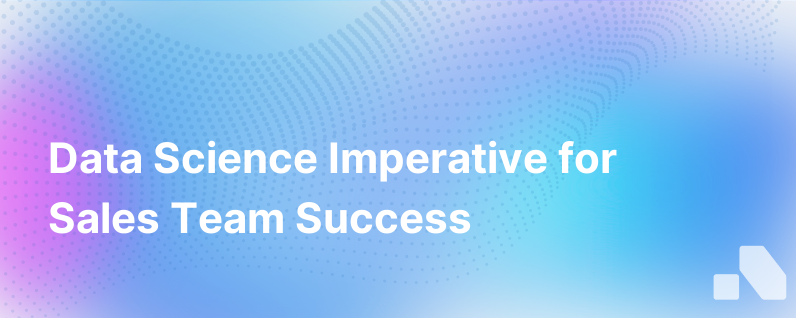
In the modern marketplace, sales teams face increasing challenges: heightened competition, informed and demanding customers, and the constant pressure to meet and exceed targets. Data science, which can seem esoteric or overly technical at first glance, is actually an essential ally in navigating these challenges. It provides the insights and tools sales teams need to refine their strategies and achieve success.
As sales evolve in lockstep with technology, understanding the transformative impact of data science isn't just an advantage—it's a necessity for any sales professional driven to excel. Here’s why data science should be at the heart of every sales organization and how it drives performance to new heights.
Harnessing Data Science for Sales: Beyond Guesswork
Sales have traditionally been driven by relationships and intuition. While these elements remain important, relying solely on them is like navigating without a compass. Data science integrates sales processes with empirical analysis, providing quantifiable benchmarks and shedding light on previously hidden patterns in customer behavior.
Advanced data analytics can predict purchase patterns, identify the most prospective leads, and even optimize pricing models for individual clients. This precise understanding multiplies the effectiveness of sales strategies, enabling reps to concentrate their efforts on the most promising opportunities.
Predictive Analytics: The Crystal Ball for Sales Success
If "knowledge is power," predictive analytics is a superpower. By scrutinizing historical data and applying machine learning algorithms, data science identifies which prospective clients are more likely to convert, which existing customers are ripe for upsell or cross-sell, and which are at risk of churn.
This insight allows sales teams to:
- Prioritize leads based on potential revenue, not just upfront cost
- Custom tailor offerings to client needs
- Forecast sales and revenue with greater accuracy
- Bearing down on customer retention when churn risks surface
Sales professionals equipped with predictions can fine-tune their pitches and interactions to align with what the data suggests will be most effective.
Personalization at Scale: The New Sales Standard
Personalized engagement is no longer a luxury—it’s an expectation. The vast storage and processing capabilities of modern data science systems enable sales teams to customize their approach for thousands, even millions, of clients simultaneously.
The data drawn from customer interactions feeds into algorithms that generate insights into individual preferences and behaviors. Sales reps can use this information to personalize their communications effectively, crafting messages that resonate more deeply with each customer.
Sales Forecasting: Steering the Revenue Ship With Precision
Forecasting is foundational in sales—committing to revenue targets without it is akin to setting sail without a course. Data science brings sales forecasting into the realm of precision, extrapolating from multiple data streams to provide projections you can stake quarterly targets on.
Not only do accurate forecasts help manage the expectations of stakeholders, but they also play a crucial role in inventory management, budgeting, and strategic planning. Data science thus becomes an indispensable partner in creating a forward-looking, data-informed sales strategy.
Enhancing Sales Productivity: Automating the Grind
Sales representatives can find themselves tangled in a web of administrative tasks that consume valuable time and energy. Fortunately, data science rides to the rescue with automation tools that offload routine activities like lead scoring, data entry, and report generation.
Automation is not about replacing people; it's about enabling your sales force to focus on what humans do best—build relationships, develop empathy, and negotiate deals. Data science, therefore, becomes the lever that elevates your team from good to exceptional.
Sentiment Analysis: Tuning Into the Customer's Voice
Data science dives deeper than overt customer actions. It taps into subtle cues from social media, support interactions, and feedback forms, parsing the sentiment behind the words. This nuanced understanding lets sales teams respond proactively to client concerns and sentiments, often before the client has fully articulated them.
With sentiment analysis, signs of dissatisfaction or delight become actionable data points, allowing organizations to pivot quickly, address concerns, and harness positive feedback to build brand advocates.
Competitive Intelligence: An Unblinking Eye on the Market
Armed with data science, sales teams can monitor competitors’ actions with remarkable accuracy. By analyzing market trends, social signals, and pricing changes, data science alerts you to shifts in competitive dynamics, giving you the chance to adjust your strategy on the fly.
This real-time intelligence is vital for staying a step ahead in an ever-fluid market. Businesses that leverage competitive insights effectively can fortify their position and seize emerging opportunities.
Aomni: Your Data Science Co-Pilot
Understanding data science is one thing; harnessing it effectively is another. That's where platforms like Aomni come in. Designed for B2B sales, Aomni provides real-time account research, competitive insights, and personalized sales content—all powered by advanced AI. This isn't just about efficiency; it's about augmented intelligence that turns your sales team into a data-powered engine.
Sales teams that embrace data science as a strategic asset unlock new levels of insight, efficiency, and effectiveness. In turn, they are equipped to deliver the personalized, timely, and relevant experiences that buyers now demand.
In conclusion, every sales professional should care about data science—it's not just a trend. It's a revolution that marries the art of sales with the precision of science. It's time to embrace this evolution, turning sales teams into agile, informed decision-makers ready to conquer the evolving business landscape.